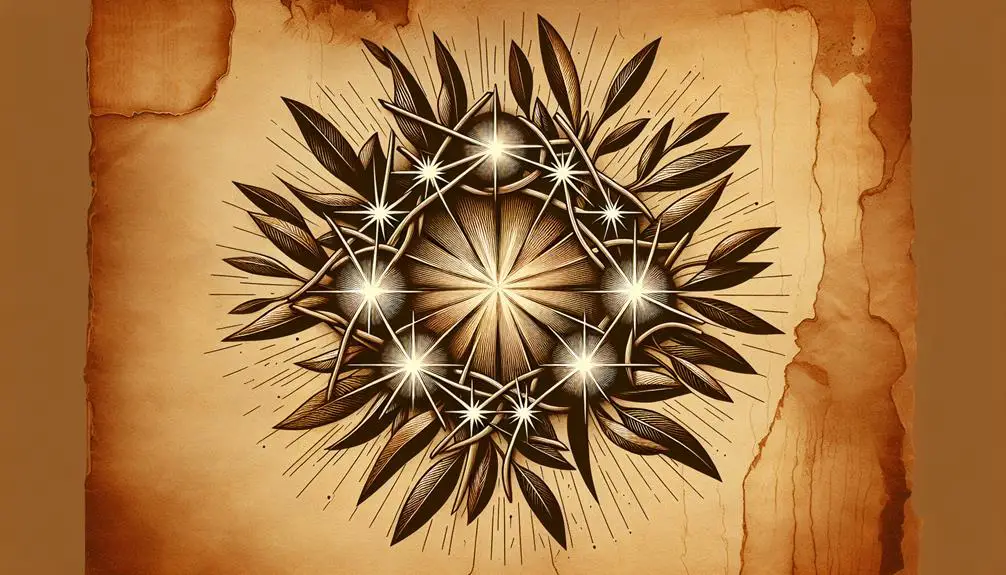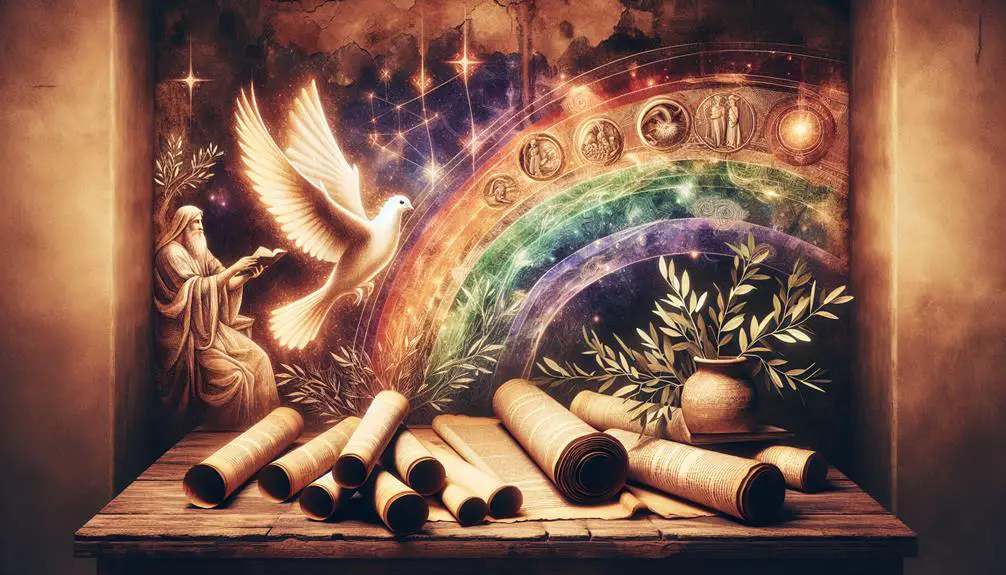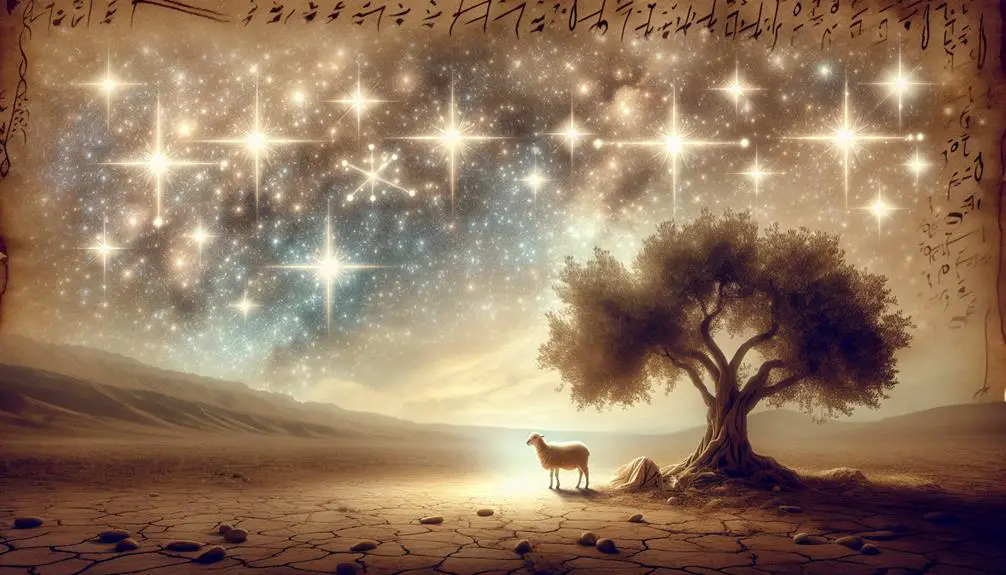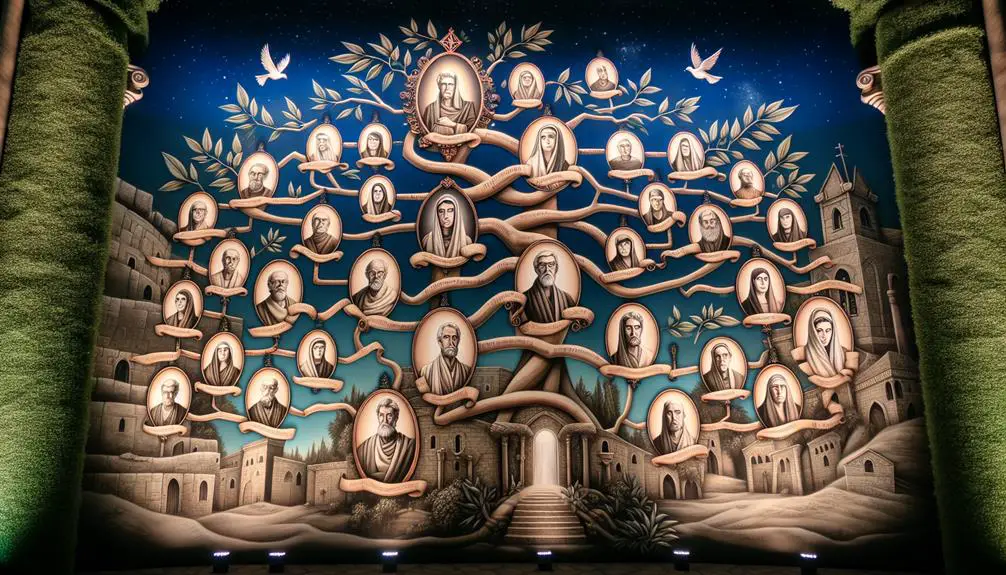Curious about the number fourteen in the Bible? Discover its deep symbolism and connection to Jesus' lineage, leaving you pondering its divine significance.

Fourteen in the Bible
When you examine the Bible, you'll find that the number fourteen holds a curious significance, as seen in the genealogy of Jesus where generations are grouped in sets of fourteen. This isn't merely a coincidence but a layered symbol that merits your further exploration.
As you navigate through the instances of fourteen in biblical prophecies, its connection to the Passover, and its subtle echoes in Revelations, you'll uncover a tapestry of meaning that might challenge your understanding of biblical numerology. This journey promises not just insights into a number but into the very fabric of biblical storytelling.
Key Takeaways
- Fourteen signifies deliverance and new beginnings, deeply rooted in Jesus' genealogy and Passover observance.
- It plays a crucial role in understanding biblical prophecies, enhancing narratives on divine revelation.
- The number represents a blend of unity within diversity, emphasizing spiritual completeness and fulfillment.
- Observing Passover on the 14th of Nisan connects believers to their historical and spiritual heritage, symbolizing liberation.
Genesis of Fourteen

In exploring the Genesis of Fourteen within biblical contexts, you uncover its foundational significance, rooted deeply in the fabric of sacred texts. This number isn't merely a quantity but a symbol laden with meaning, a beacon guiding one through the narratives and laws that shape the Judeo-Christian tradition. The study of numerical symbolism in biblical literature reveals that numbers often carry more weight than their face value, embodying theological and moral truths.
Fourteen, in particular, stands as a testament to this rich tradition of encoded messages. Its appearances are strategic, not random, pointing to themes of deliverance and completion. For instance, the generations from Abraham to David, and from David to the Babylonian exile, are divided into sets of fourteen, illustrating a divine structure in human history. This structuring underscores the belief in a providential order guiding humanity's journey, a journey marked by trials, tribulations, and eventual redemption.
Cultural interpretations of fourteen further enrich its significance. In ancient Near Eastern cultures, numbers weren't just mathematical entities but held spiritual and cosmic significance. Fourteen, therefore, can be seen as a composite symbol, carrying meanings from its constituent numbers—one (unity) and four (the material world, often represented by the four cardinal points or the four elements). This combination suggests a unity of purpose within the diversity of creation, a harmony orchestrated by the divine.
As you delve deeper into the Genesis of Fourteen, you uncover layers of meaning that transcend simple arithmetic. This exploration isn't just academic; it's a journey into understanding how ancients perceived their world and their place within it, guided by the belief in a cosmos imbued with divine order.
Fourteen in Prophecy

Exploring further, you'll find that fourteen's significance extends into the realm of prophecy, where it serves as a key to unlocking visions of the future embedded within biblical text. One of the most compelling examples of this is found in the concept of Daniel's weeks, a prophecy that outlines a comprehensive framework for understanding historical and eschatological events. This prophecy, articulated in the book of Daniel, divides history into weeks of years, specifically seventy weeks, where each week represents seven years. The intricate division of these weeks has been subject to various interpretations, but it's the segmentation into periods of seven that echoes the symbolic importance of fourteen, as it represents two sets of these prophetic weeks.
Moreover, the narrative of Nebuchadnezzar's dream, as interpreted by Daniel, utilizes numbers to convey the rise and fall of empires, with a focus on the temporal nature of earthly kingdoms versus the eternal kingdom of God. This dream, although not directly mentioning the number fourteen, is steeped in numerical symbolism that resonates with the broader themes of biblical numerology. The dream's interpretation underscores the cyclical and predetermined nature of divine prophecy, where numbers like fourteen play a subtle yet significant role in the overarching biblical narrative.
In delving into these prophetic accounts, you're engaging with a tradition that sees numbers not just as quantitative values but as carriers of deep spiritual significance. Fourteen, within this tradition, becomes more than a number—it's a symbol that weaves through prophecy, adding layers of meaning to the biblical understanding of time, history, and divine revelation.
The Genealogy Connection

Delving into the genealogical records of the Bible, you'll notice that the number fourteen emerges as a pivotal marker in tracing the lineage of key biblical figures. This observation isn't merely coincidental but deeply rooted in divine numerology, offering a symbolic representation that underscores its theological significance.
The Gospel of Matthew meticulously organizes Jesus' genealogy into three sets of fourteen generations, a pattern that's not arbitrary but laden with meaning. This structuring is a deliberate act, showcasing Matthew's intention to highlight Jesus' royal lineage, connecting Him directly to King David and Abraham, thereby fulfilling Old Testament prophecies. The use of fourteen in this context isn't just a historical recount; it serves as a theological statement, emphasizing Jesus' rightful place within Jewish history and His divine mission.
This symbolic representation of fourteen extends beyond mere lineage recording. It reflects the intricate design within the Bible's narrative structure, where numbers serve as keys to understanding deeper spiritual truths. Fourteen, thus, isn't just a figure but a theological symbol, intricately linked with themes of salvation, covenant, and divine governance.
Moreover, this divine numerology invites readers to delve deeper into the text, encouraging a contemplative engagement with Scripture. It's not just about who begat whom; it's about understanding God's sovereign plan through the ages, as represented in the genealogical framework. The inclusion of fourteen as a genealogical marker bridges the gap between historical record and divine revelation, offering a rich tapestry of faith, heritage, and prophecy.
Passover and Fourteen

The number fourteen holds significant importance in the observance of Passover, marking the day on which this pivotal Jewish festival commences each year. Rooted in historical and religious tradition, Passover's timing is intricately linked to the lunar calendar, highlighting the meticulous attention ancient cultures paid to celestial patterns in determining their religious observances.
The 14th day of Nisan, a month in the lunar calendar, is critical for several reasons, not least of which are the sacrificial preparations that precede the Passover meal. This day serves as a beacon, guiding the faithful through a meticulous preparation process that underscores the liberation of the Israelites from Egyptian bondage.
Consider the following points:
- Lunar Calendar Alignment: The reliance on a lunar calendar for determining the date of Passover underscores the deep interconnection between celestial movements and religious observances, ensuring that the festival retains its seasonal relevance and historical accuracy.
- Sacrificial Preparations: Sacrificial rites are central to Passover's observance, with the preparation and consumption of the Passover lamb being a direct commemoration of the Israelites' last night in Egypt.
- Historical Remembrance: The 14th of Nisan serves not just as a date, but as a moment of collective memory and spiritual reenactment, connecting participants across generations to their ancestral past.
- Ritual Purification: The lead-up to the 14th involves rigorous cleaning and the removal of leavened bread from homes, symbolizing a spiritual purification and readiness to embark on a new beginning.
In essence, the number fourteen encapsulates a complex blend of astronomy, history, and faith, making it a cornerstone of the Passover festival.
Revelations and Reflections

While Passover exemplifies the significance of the number fourteen through historical remembrance and ritual, another dimension unfolds when we examine its role in biblical revelations and personal reflections. The number fourteen isn't just a marker of time or events; it's imbued with layers of numerical symbolism that speak to a deeper understanding of divine completion and the human experience in relation to the divine.
Aspect |
Description |
Significance |
|---|---|---|
Generations |
In Matthew's Gospel, the genealogy of Jesus is structured around three sets of fourteen generations, emphasizing a divine pattern and fulfillment. |
Symbolizes divine completion and the fulfillment of prophecies. |
Days of Preparation |
The fourteen days leading to Passover serve as a period of reflection and purification, echoing the Israelites' preparation for liberation. |
Represents a journey towards spiritual renewal and liberation. |
Sacrificial Offering |
Leviticus details the offering of fourteen lambs as part of certain feasts, reflecting completeness in devotion to God. |
Emphasizes the importance of complete devotion and surrender to divine will. |
Divine Messages |
In Revelations, the number fourteen can be interpreted as symbolizing deliverance and salvation, offering hope in the midst of trials. |
Encourages reflection on the promise of salvation and divine rescue. |
Personal Reflection |
Engaging with the number fourteen prompts individuals to consider their own journey towards spiritual completeness and fulfillment. |
Invites a deeper exploration of one's spiritual path and relationship with the divine. |
Through these lenses, the number fourteen transcends its literal sense to embody a multifaceted symbol of divine completion and spiritual reflection. It beckons you to ponder your place within a divinely ordained order, urging you to seek completeness in your spiritual walk.
Frequently Asked Questions
How Does the Number Fourteen Influence the Architectural Designs of Biblical Temples or Structures?
In analyzing architectural designs of biblical temples or structures, you'll find fourteen pillars play a significant role. This isn't just a matter of aesthetics; it's deeply rooted in construction symbolism.
These pillars aren't arbitrary; they're thought to embody spiritual meanings, reflecting beliefs and principles.
When you delve into the construction of these sacred spaces, the choice of fourteen pillars reveals a layer of symbolic interpretation that enriches your understanding of their architectural and spiritual significance.
Are There Any Specific Dietary Laws or Practices in the Bible Associated Exclusively With the 14th Day of Any Month?
You're exploring a unique dietary custom linked to a specific date.
Specifically, the Passover observance falls on the 14th day of the first month in the biblical lunar calendar. This day dictates a dietary practice where unleavened bread is eaten, symbolizing a swift departure from Egypt, leaving no time for bread to rise.
This ritual, deeply analytical and scholarly in nature, highlights a profound connection between date, dietary law, and historical significance.
What Is the Significance of the Number Fourteen in the Context of Biblical Miracles or Parables Not Directly Related to Prophecies or Genealogies?
You're exploring a niche area, as the number fourteen doesn't directly tie to biblical miracles or parables outside prophecies or genealogies. There aren't 'fourteen plagues' or miracles with durations explicitly tied to fourteen days, making your journey more complex.
To understand its significance, you'd delve into deeper, symbolic interpretations rather than straightforward narratives, examining how numbers may indirectly influence the storytelling or moral lessons within these spiritual texts.
How Has the Interpretation or Symbolism of the Number Fourteen Evolved in Modern Christian Denominations Compared to Its Biblical Origins?
In modern Christian circles, the number fourteen has blossomed beyond its biblical roots, weaving through the fabric of genealogical patterns and prophetic symbolism.
You'll find that its interpretation has evolved, reflecting broader theological insights rather than sticking strictly to ancient narratives. This shift mirrors a deeper, analytical examination of biblical numerology, where scholars and believers alike explore beyond the surface, seeking nuanced meanings that resonate with contemporary faith practices.
Can Any Correlations Be Drawn Between the Number Fourteen and the Musical or Poetic Structures Found in the Psalms or Other Biblical Hymns?
You might wonder if there's a link between fourteen syllables and Psalm patterns or other biblical hymns. Analyzing these texts, you'll find that while specific syllable counts, like fourteen, aren't consistently significant in biblical poetry, patterns of parallelism and repetition are more critical.
However, you could explore deeper to see if any exceptions or subtler correlations exist, especially in more structured poetic books like Psalms, where numerical symbolism often holds deeper meanings.
Conclusion
In your journey through the biblical landscape, you've unearthed the rich tapestry of fourteen, a number woven with divine threads. From its genesis to prophetic revelations, it serves as a celestial beacon, guiding through history's shadowed corridors.
In its embrace, genealogy and sacred observances intertwine, revealing a mosaic of faith's enduring legacy. As dusk falls on this exploration, may you find solace in the knowledge that fourteen's essence, veiled in mysticism, echoes eternity's whisper, inviting reflection and awakening.



Sign up